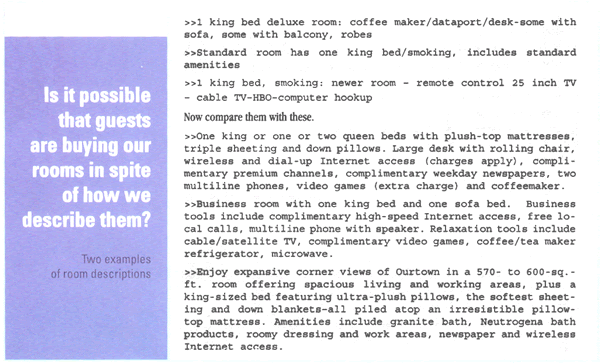WORDS MATTER!
In an online world, the words with which we describe our hotels, and our rooms — drive (or deter) bookings.
I am returning in this article to one of my pet topics — the skill (or lack of it) with which we in the hotel business create written descriptions of our hotels, our rooms in those hotels, our services and our amenities.
We rely on word — sometimes supplemented by photos — to present our lodging in the CRS (for use by reservation center agents), in the GDSs, in our brand direct Web sites, and in a cascade of third party Web sites. The words are especially important in Web sites, whose viewers will often use the Web as their only information source in making their accommodation decisions.
The words we use — usually few in number since the space allowed for these descriptions is always too short — must be carefully chosen to individually and collectively meet several goals. We rely on them to:
- Describe
A product and communicate its value proposition. - Confirm
That we will supply the desired facilities and services. - Reassure
The guest that our property will be a wise choice. - Communicate
The intangibles and subtleties: comfort, security, convenience. - Motivate
To make a reservation.
And in some cases, EXCITE them, creating anticipation of the visit.
We need room descriptions, rate descriptions and hotel descriptions to communicate a great deal. Clear, effective descriptions that achieve the objectives identified above are a competitive differentiator.
But too few hotels achieve the full benefit from the descriptive opportunity. Why is this the case? Simply stated, it is because we continue to pay little attention to our written descriptions.
Take a look at the examples provided on this page. What differentiates the two examples? For one thing, it is the use of descriptive, appealing, quality-oriented terms. Second, it is structuring these descriptions to place the items generally of greatest interest, and those separating it from its competitors, first. In a wired word, “free high-speed Internet access” trumps an inventory-like description that begins, “hair dryer”. “Soft, inviting bedding” evokes greater emotion and appeal than “TV with HBO”. (Is there any hotel that does not offer a television in a room today? Why use valuable space to talk about them?”

Our descriptions should give potential guests a variety of reasons to become committed guests — guests holding reservations.
Joan Lowell, the vice president of electronic distribution at Global Hyatt, once told me something that I have never forgotten. Lowell said that Hyatt had seen clear and continuous evidence of an important lodging purchase pattern that is unique to Web bookings. On brand Web sites, unlike travel agent assisted bookings or calls to hotel reservation centers, given the opportunity Web site visitors upsell themselves. Yes, they come to the site for the lowest rate but then, if the room descriptions for increasingly expensive room types convey increasingly greater benefits for selecting more expensive options, time and again site visitors pick the next most expensive room type or even the one beyond that. Effectively, people are saying, “I visit the site for the $99 rate but once there, if for $10 or $20 more I can stay in a room with obviously greater appeal, I’m sold.” If the value is there, and clearly and appealingly communicated, they will trade up. How many Web sites have room descriptions that give the reader a reason to trade up?
My challenge then, to every general manager, DOS, reservation manager, revenue manager and e-commerce manager, is to take a hard look at your room descriptions. Look at them as they appear in each of the channels. Do they entice and reassure? Or must travelers reserve accommodation at your property in spite of what you say about it? If the latter is the case, this is not an expensive repair process, just a vital one.
